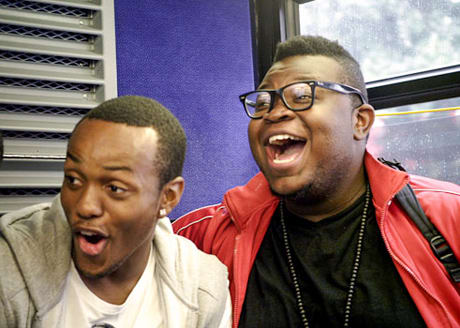If Kid 'n Play were to have a guest appearance on an extra special episode of A Different World, where the In Living Color fly girls came out for a good time in full Salt-n-Pepa attire, it might look and feel something like Michel Gondry's contextually relevant homage to the early '90s hip-hop scene, The We and the I.
All the visuals are hyper-realized and saturated with bright colours and a generic old school hip-hop beat is omnipresent for the duration of the film, which takes place almost entirely on a public bus-ride home on the last day of school for a group of teens from the Bronx.
And since this is a Michel Gondry film, the many conversations — almost all of which feel entirely improvised and natural, save the third act melodrama — have comic, home-movie style inserts with homemade props, not unlike the sets of Be Kind Rewind.
This distinct and innovative approach to the material makes the overall melodramatic, angst-ridden potential of the piece, which is based on a workshop Gondry did with these kids in an afterschool arts program, all but non-existent.
Still, the central dramas involving a lesbian sexual assault at a party, some overt bullying and harassing of peers, and the occasional petty crime gone awry are handled with a sense of knowing maturity amidst the comedy.
This is due to Gondry mixing topics like rape with trivial teen nonsense, such as making a list of who to invite to a "Sweet 16" party. Both are discussed with the same sense of irreverence and callous candour that makes the severity less oppressive. It also helps that the overall tone of the film is that of afterschool special satire, with broad, old school sitcom jokes juxtaposed against nudity and candid discussions about accidental internal ejaculation.
This experimental and deceptively simple story about teen social hierarchies and behaviours that seem eerily premonitory is far more entertaining and engaging than it has any right to be. It's as though Gondry has found the ideal way to take a bullshit Degrassi improvisational text and make it culturally relevant and accessible. Played straight, this would be unbearable.
(108)All the visuals are hyper-realized and saturated with bright colours and a generic old school hip-hop beat is omnipresent for the duration of the film, which takes place almost entirely on a public bus-ride home on the last day of school for a group of teens from the Bronx.
And since this is a Michel Gondry film, the many conversations — almost all of which feel entirely improvised and natural, save the third act melodrama — have comic, home-movie style inserts with homemade props, not unlike the sets of Be Kind Rewind.
This distinct and innovative approach to the material makes the overall melodramatic, angst-ridden potential of the piece, which is based on a workshop Gondry did with these kids in an afterschool arts program, all but non-existent.
Still, the central dramas involving a lesbian sexual assault at a party, some overt bullying and harassing of peers, and the occasional petty crime gone awry are handled with a sense of knowing maturity amidst the comedy.
This is due to Gondry mixing topics like rape with trivial teen nonsense, such as making a list of who to invite to a "Sweet 16" party. Both are discussed with the same sense of irreverence and callous candour that makes the severity less oppressive. It also helps that the overall tone of the film is that of afterschool special satire, with broad, old school sitcom jokes juxtaposed against nudity and candid discussions about accidental internal ejaculation.
This experimental and deceptively simple story about teen social hierarchies and behaviours that seem eerily premonitory is far more entertaining and engaging than it has any right to be. It's as though Gondry has found the ideal way to take a bullshit Degrassi improvisational text and make it culturally relevant and accessible. Played straight, this would be unbearable.
